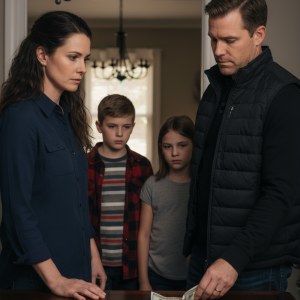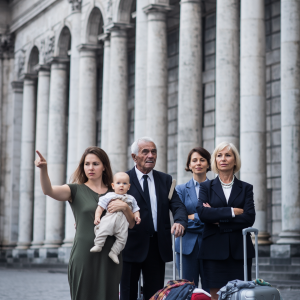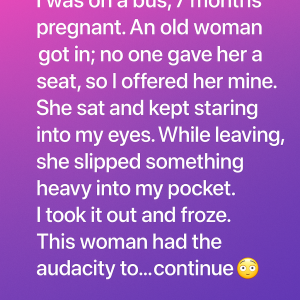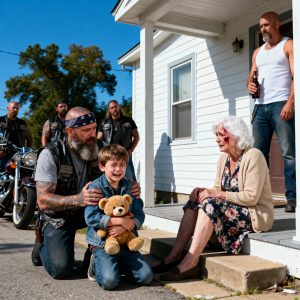A grieving father crossed the country to meet his newborn—only to be told he couldn’t board a flight home with her. What happened next hinged on the kindness of an 82-year-old volunteer who changed everything.
Nathan Ellis was midway through retiling his kitchen when the phone rang.
“Is this Mr. Ellis?” a calm voice asked.
“Yes,” he answered, wiping sweat from his brow.
“I’m calling from a hospital in Fort Lauderdale. A baby girl was just born—you’re listed as the father.”
For a second, Nathan thought it was a cruel joke. Then he remembered where his wife was.
A week earlier, he’d surprised his pregnant wife, Dana, with a short Florida getaway before their first biological child arrived. They had adopted three kids over six years and, against all odds, Dana had finally conceived. The pregnancy was healthy; the due date was two months away—this wasn’t supposed to be happening yet.
Nathan, who had once been a foster kid himself, had built his life around protecting children. Now he was being told his wife had gone into labor—far from home. Something in the caller’s tone warned him the news might get worse.
Within hours, he packed a bag, called in favors at work, and grabbed the next flight south.
Visual: Nighttime airport curbside, one carry-on rolling fast. (Keywords: night airport curbside rolling suitcase)
He landed, skipped the hotel, rented a car, and sped to the hospital. In the maternity wing, a nurse directed him to a volunteer who’d asked to meet him.
“Come in,” said a warm voice when he knocked. The name tag read: Meredith Blake.
“Where’s my wife? Where’s Dana?” Nathan blurted.
Meredith’s eyes gentled. “Please—have a seat.”
“I’d rather stand.”
“I’m so sorry,” she said softly. “There were complications. Your wife…didn’t make it.”
Nathan’s legs gave out. He wept, and Meredith sat with him in silence.
When the storm of grief finally eased, Meredith added, “Your daughter is strong. She’s in the NICU for observation.”
“I’m here to take her home,” he whispered.
“I know,” she said. “We just need to be sure you’re prepared—it’s protocol.”
Nathan told her about the house full of love waiting for this baby—two adult children, three adopted kids, and a nursery Dana never got to see. Meredith listened, then pressed a slip of paper into his hand. “My number. Call for anything. I’ll even drive you to the airport when it’s time. You’re not alone.”
Days blurred into feedings, forms, and whispered promises to a tiny girl he named Lena. When the hospital finally cleared their release, Nathan thanked every nurse he passed and headed to the airport with his four-day-old.
At the counter, the agent frowned. “Sir, I can’t let you board with the baby. Infants must be at least seven days old, and we need her birth certificate.”
“She’s four days old,” Nathan said. “I’m her father. We just left the hospital.”
“I’m sorry. You’ll have to wait three more days.”
Nathan’s chest tightened. He had no hotel, no family in Florida, and five children grieving back in Texas. He glanced at sleeping Lena—and reached for the card in his wallet.
“Meredith? It’s Nathan. I…need help.”
Less than an hour later, she arrived. “Come on,” she said, looping her arm through his. “You’ll stay with me.”
Her home was small and lavender-scented. She set up a makeshift bassinet and ushered him to the guest room. “I raised four kids,” she smiled. “You two aren’t a burden.”
Nathan stayed more than a week. Meredith became a lifeline—rocking Lena when he couldn’t keep his eyes open, cooking simple meals, talking when he needed it and vanishing when he didn’t. She even arranged to bring Dana’s body home to Texas—because Nathan couldn’t face the calls.
One dawn, Nathan found her humming to Lena in the garden. “I don’t know how to thank you,” he said.
“You already have,” she answered without looking up.
They slipped into a rhythm—slow walks, midnight feedings, and quiet talks about love and loss. Meredith told him about four children, seven grandkids, three great-grandkids, and a husband she’d loved for sixty years. Volunteering kept her connected since he’d passed.
Nathan understood. Lena had pulled him back from the edge. Meredith had pulled them both.
When the birth certificate arrived and the airline finally cleared them, Nathan packed to leave. “I’ll miss you,” he said.
“I know,” she replied, hugging them both. “I’ll miss you, too.”
Back in Texas, grief came in waves—sleepless nights, children’s tears, and the reflex to reach for a hand that wasn’t there. Still, he called Meredith often, sent photos of Lena, and flew out every year to visit. When Lena turned five, they went again—what would be their last time.
A few months later, Meredith passed in her sleep. At the funeral, a lawyer approached Nathan. “She left part of her estate to you—and to Lena,” he said.
Stunned, Nathan later learned she’d included him the way she had her own children—and left a letter: “You brought light into a quiet house. Keep giving Lena the world.”
Nathan didn’t keep the money. Instead, he met with Meredith’s four children, and together they launched a foundation in her name to support foster and adoptive families. Her eldest, Clara, threw herself into the work. Grief and gratitude gradually braided into something more.
Years later, Nathan and Clara married. She became a mother to his six children, and the home Meredith once opened became the compass for theirs—second chances, made real.
Meredith had given them more than a place to stay. She’d given them shelter, then family, then hope—and a way to pass it on. Nathan would never forget her.





